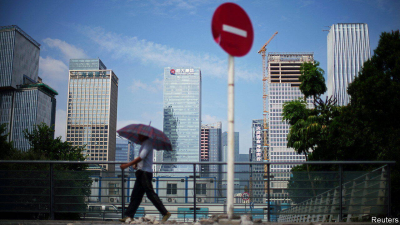The Economist-Evergrandes liquidation is a new low in Chinas property crisis Finance economics
January 30, 2024 4 min 675 words
这篇报道揭示了恶劣的中国房地产危机中的新低点:恒大集团的清算。香港法官在一项具有里程碑意义的裁决中下令对这家拥有超过3000亿美元负债的全球最负债地产开发商进行清算。裁定引发的涉外债权人必须在中国内地追讨损失,将香港法院与试图恢复市场信心的中国政府置于对立境地。 报道指出,恒大是中国房地产危机的中心,政府规定的债务规则推动了其于2021年晚些时候违约。此后,中国大多数上市房地产开发商要么未能偿还投资者,要么被迫进行重组。他们的信贷渠道几乎被切断,导致全国范围内的项目停工。购房者推迟购买,导致销售价值同比下降6.5%。这令大多数财富都存放在房产中的中国民众感到不安。 裁决可能让香港法院与中国政府产生冲突,尤其是在涉及对恒大在中国内地的资产进行清算时。香港的裁决可能受到内地法院的否决,因为它们可能扰乱公共秩序。此外,报道提到,对恒大在中国资产的全面清算可能对中国经济造成冲击,因为房地产开发商已将许多尚未交付的房产出售给普通中国人。最终,裁决留下了重组的可能性,但由于涉及的主要资产都在中国,这仍然是一个问题。这次清算标志着中国房地产危机的新低点,但这个危机远未结束。
“Enough is enough,” declared a Hong Kong judge on January 29th of Evergrande, a failing Chinese property behemoth, and its two-year struggle to avoid repaying its creditors. In a landmark ruling, the court ordered a liquidation of the company, which, with more than $300bn in liabilities, is the world’s most indebted real-estate developer. A provisional liquidator will be appointed, assuming management of the company. Now foreign creditors must attempt to recoup their losses from a firm that holds most of its assets in mainland China. The ruling could pit Hong Kong’s courts against a Chinese government determined to restore public confidence to a struggling market.
No firm has been more central to China’s property crisis, which kicked off when Evergrande first showed signs of weakening in mid-2021. Government rules meant to wean developers from debt eventually pushed the company to default later that year. Since then a majority of China’s listed property developers have either failed to pay their investors back or have been forced into restructuring. Their access to credit has been virtually cut off, causing builders to stop working on projects across the country. Prospective homebuyers have delayed purchases, leading to a 6.5% decline in the value of sales, year on year. This has unnerved a population that stores most of its wealth in property.
Until relatively recently policymakers had hoped that a successful restructuring of Evergrande could pave the way for a slow but steady revitalisation of the market. Instead, Evergrande missed important deadlines for producing a restructuring plan and, when it did offer one, underwhelmed investors. Its proposal, which was panned by bondholders, involved giving creditors a stake in some of Evergrande’s other businesses, such as its electric-vehicle line. Far from restoring confidence, the battle became increasingly ugly. At one point a group of bondholders demanded that Hui Ka Yan, Evergrande’s chairman, put up $2bn of his own money. Mr Hui was later detained by Chinese authorities. His whereabouts are unknown.
The housing crisis has drained global investors of confidence in Chinese policymaking. It is now doing similar damage to Hong Kong’s reputation. For decades, foreign investors have gained access to China through Hong Kong. One of Hong Kong’s distinct features has been a legal system, separate from China’s, that is based on common law. But court rulings in Hong Kong have no guarantee of being upheld in mainland China, where almost all of Evergrande’s assets are based.
The liquidator appointed by a Hong Kong court will be forced to deal with local authorities that may not recognise an order drawn up outside China’s legal system. Although a pilot project to recognise cross-border rulings was set up in 2021, qualification requirements are tough and the scheme is only recognised in a few cities. Hong Kong rulings can easily be shot down by mainland courts if they have the potential to disturb public order.
Indeed, as Tommy Wu of Commerzbank, a German lender, has written, a full liquidation of Evergrande’s Chinese assets would probably send a shock through the Chinese economy. Property developers have sold many properties to ordinary Chinese folk that they have not yet provided. Investors’ claims on Evergrande’s projects, or any cash holdings it still has, could get in the way of their delivery. This would work against Beijing’s best efforts to restore confidence in the market. Any such activity would be viewed by policymakers as unacceptable, almost guaranteeing that the liquidation process will be long and drawn out.
The latest Hong Kong ruling leaves room for restructuring, with the judge noting that Evergrande can still offer this to creditors. The company says that it aims to produce a new plan, possibly by March, and since a liquidator will be taking over negotiations there may now be a better chance of a deal. But it will not be one that includes many Chinese assets. And for a firm that mainly owns Chinese property, that is a problem. Evergrande’s liquidation marks a new low in China’s property crisis—it is far from the end of it. ■

